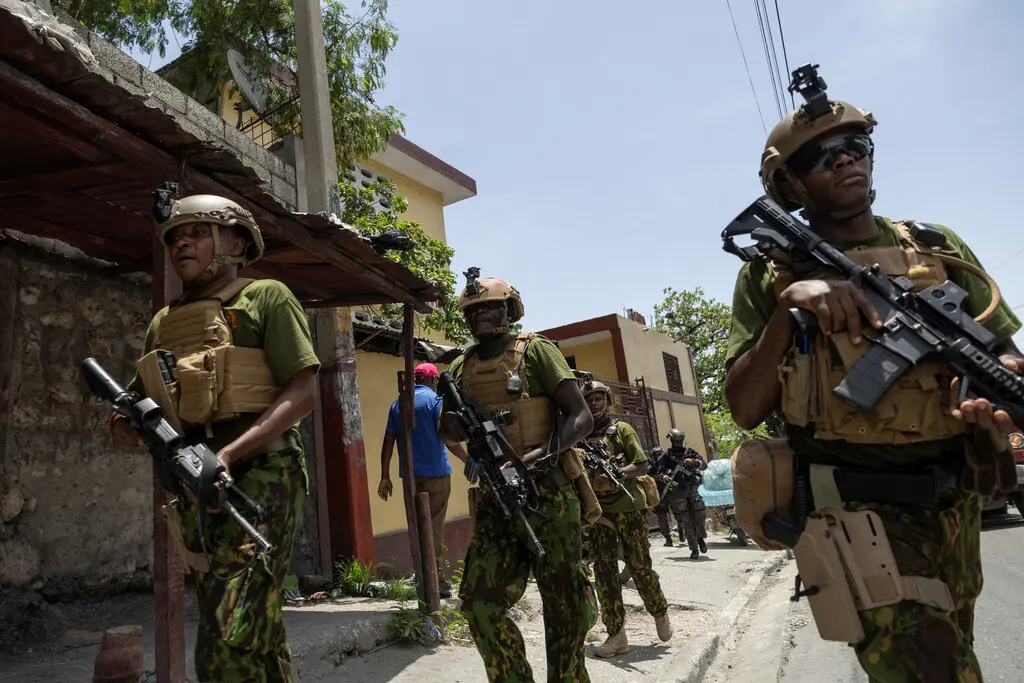For months, Haiti gangs have terrorized communities, controlling food supplies, extorting farmers, and turning once-busy roads into no-go zones. But on Tuesday, August 19, the tables turned.
In a dramatic anti-gang operation led by Kenyan officers under the Multinational Security Support (MSS) mission, in joint coordination with Haitian police, the gangs suffered a humiliating defeat.
Forced to flee their hideouts in Dofunor, 198 kilometres from Port-au-Prince, the gangs left behind trenches, broken bridges, and failed strategies. What was meant to stall the mission became their undoing.

Haiti Gangs Miscalculate in Battle Against Kenyan Police
The Dofunor operation exposed the growing desperation of Haiti gangs. After tightening their grip on the Artibonite region, they believed they could block MSS advances with crude yet strategic tactics. Gang fighters dug deep trenches, destroyed Palmiste Bridge, and set up blockades to isolate security teams. But the move backfired.
With actionable intelligence, Kenyan-led MSS forces launched a dawn ambush. Haitian police officers joined the strike, cornering the gangs before they could regroup. Within hours, fighters scattered into the countryside, abandoning weapons and retreating northward. Farmers who had been trapped by weeks of violence suddenly found relief.
Rice farmers, whose storage facilities had been raided and held hostage, finally accessed their grain. MSS patrols secured the township of Petit Rivière and surrounding routes toward Palmiste, Laverdure, Canal, and the cemetery, reassuring locals that the tide was turning against the gangs.
MSS Commander Godfrey Otunge praised the resilience of residents, stressing that the mission’s success relied heavily on community cooperation. He pledged to rebuild the destroyed bridge, reopen vital routes, and sustain operations until Haiti gangs lose their last stronghold.
The Farmers Who Defied Fear
The most striking outcome of the operation was the renewed courage of ordinary Haitians. Under MSS protection, hundreds of farmers turned out in large numbers to reclaim their rice from community stores. For them, the operation was more than a military win—it was the first real sign of freedom after months of intimidation.
Residents of Artibonite described how gangs had dictated their daily lives, charging illegal fees and enforcing curfews. Farmers risked starvation while their harvests rotted in locked warehouses. The August 19 ambush not only restored access to food but also restored faith that the MSS mission could achieve results where past interventions failed.
Otunge echoed this sentiment, declaring, “Very soon we will be talking about a new Haiti. The MSS mission is the only hope for the Haitian people.” His words carried weight, underscoring a broader strategy to prevent gangs from regrouping by strengthening defences in quieter regions.
Why Haiti Gangs Are Losing Ground
Despite their brutality, Haiti gangs are increasingly on the defensive. Their decision to rely on trenches and destroyed bridges betrayed their lack of advanced strategy against better-trained MSS officers. The Kenyan-led mission has relied on speed, intelligence, and close community ties—outmatching gangs who depend on fear and chaos.
Security analysts argue that gangs underestimated both the resolve of local communities and the operational discipline of Kenyan police. Unlike previous foreign interventions, the MSS has shown a willingness to work closely with Haitian forces and civilians, making it harder for gangs to exploit divisions.
Furthermore, the mission’s commitment to keeping roads open, restoring bridges, and securing farmland directly challenges the gangs’ economic lifeline. By reopening trade routes, MSS denies the criminals their ability to tax farmers and control food supplies, effectively weakening their financial grip on the population.
The failed ambush in Dofunor was more than a tactical loss—it signalled a shift in power dynamics. For the first time in years, gangs were seen fleeing rather than dictating the terms of battle.
If the MSS sustains its momentum, this could be the beginning of the end for Haiti gangs and the rebirth of a country desperate for peace.


